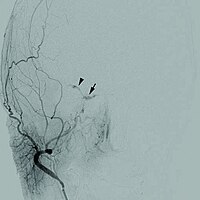
Photo from wikipedia
Amyotrophic lateral sclerosis (ALS) is a devastating disease that like multiple other neurologic diseases has no curative treatment currently available. Environmental exposures to known neurotoxic compounds (e.g., pesticides, heavy metals,… Click to show full abstract
Amyotrophic lateral sclerosis (ALS) is a devastating disease that like multiple other neurologic diseases has no curative treatment currently available. Environmental exposures to known neurotoxic compounds (e.g., pesticides, heavy metals, cyanobacterial toxins, etc.) are identified as risk factors associated with ALS. Assuming these environmental factors have causative roles in disease risk and given the ubiquity of these types of exposures for the modern human, why are not more people afflicted with ALS? Herein is proposed an energy balance moderation framework (EBMF)—a framework that postulates energy balance as a key moderator of neurologic disease risk. The EBMF proposes that the ability of the body to handle toxic compound exposures through excretion, metabolism, and/or storage impacts the acute and chronic tissue-specific toxicity which is moderated by energy balance. In this model, positive energy balance (weight gain or excess body weight/mass) would be protective against acute neurotoxic exposure permitting the assimilation and sequestration of toxic compounds within body stores separate from the nervous system. However, this protective buffering could be lost during sustained negative energy balance (weight loss) with the release of sequestered compounds redistributing to the nervous system. The EBMF may have relevance beyond ALS for other neurologic diseases with demonstrated environmental risks (such as Alzheimer’s and Parkinson’s disease) and offers new insights into potential strategies to reduce disease risk and develop novel treatments.
Journal Title: Neurotoxicity Research
Year Published: 2020
Link to full text (if available)
Share on Social Media: Sign Up to like & get
recommendations!